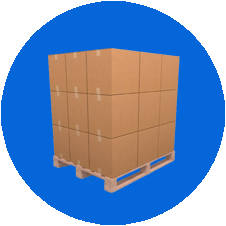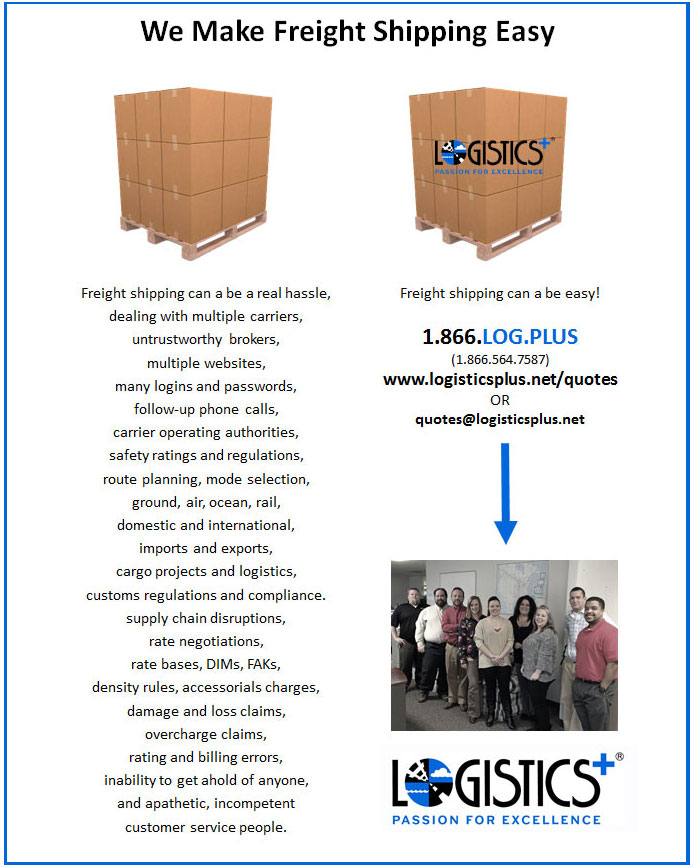 Are you new to freight shipping?
Are you new to freight shipping?
In today’s lean workplace environment, it’s not uncommon for managers to ask employees to wear “multiple hats.” Operations people may be asked to make sales calls, accounting professionals may be asked to fill-in for operations, or office personnel might be asked to arrange for freight shipping. This latter example might happen with greater frequency as some owners or plant managers may view freight shipping as nothing more than calling a couple freight carriers for quotes and then arranging for a pickup – but as many of us know, there’s a little more to it than just that. So here’s a quick freight shipping 101 primer for those of you just starting out.
What is freight shipping?
Although the term “freight” can generically refer to “a charge paid for carriage or transportation of goods,” in the U.S. the term most often refers to larger (non-parcel) sized shipments that move with a less-than-truckload (LTL) or full truckload (FTL) carrier.
 LTL shipments occupy only a portion of the truck’s trailer, generally range anywhere from 150 to 10,000 pounds, and are often shipped on pallets or skids. LTL carriers normally have set routes where they routinely pickup and deliver their shipments. Local “city” trucks will make deliveries and pickups throughout the day. LTL shipments picked up are brought back to a local freight terminal where they are consolidated for highway travel. “Linehaul” trucks will then move full trucks from one city to the next, where the local city operation will deconsolidate shipments for final delivery. Because of the “network” investments needed for this type of operation, the majority of LTL shipments handled in the U.S. are handled by as few as 25 national or regional LTL carriers. When you buy LTL services, you are basically renting a portion of the trailer for your shipment. Because there are limited alternatives, negotiating good rates and maintaining leverage with your selected carriers is important. Working with a reputable 3PL/broker that specialized in LTL service can help you secure competitive rates and ensure you are getting good customer service.
LTL shipments occupy only a portion of the truck’s trailer, generally range anywhere from 150 to 10,000 pounds, and are often shipped on pallets or skids. LTL carriers normally have set routes where they routinely pickup and deliver their shipments. Local “city” trucks will make deliveries and pickups throughout the day. LTL shipments picked up are brought back to a local freight terminal where they are consolidated for highway travel. “Linehaul” trucks will then move full trucks from one city to the next, where the local city operation will deconsolidate shipments for final delivery. Because of the “network” investments needed for this type of operation, the majority of LTL shipments handled in the U.S. are handled by as few as 25 national or regional LTL carriers. When you buy LTL services, you are basically renting a portion of the trailer for your shipment. Because there are limited alternatives, negotiating good rates and maintaining leverage with your selected carriers is important. Working with a reputable 3PL/broker that specialized in LTL service can help you secure competitive rates and ensure you are getting good customer service.
Truckload (or FTL) carriers differ from LTL carriers in that they have no predefined network. Their drivers and trucks typically make a pickup and then deliver directly to the final destination (where they must find another shipment to haul somewhere else). Truckload shipments generally weigh over 10,000 pounds, occupy the majority of a truck’s trailer, or have some unique dimensions or handling requirements. Because anyone with a truck can make a pickup and/or delivery, there are thousands of truckload carriers specializing in all types of equipment: dry vans, flatbeds, refrigerated trailers, liquid tanks, and more. When you by FTL services, you are basically renting the entire trailer for your shipment. Because choices are unlimited, finding reliable and safe truckload carriers with the right equipment at the right price can be a time-consuming effort. Working with an experienced 3PL/broker that specializes in truckload service can help minimize time commitments and safety concerns. Experienced and reputable 3PLs like Logistics Plus will pre-screen carriers to ensure they have the proper operating authorities, insurance, and safety background. They will also be adept at using load boards and other transportation management tools to find you the right carrier at the right price.
How should I pack my shipments?
You should package, crate, or stack on pallets securely to prevent damage. Use banding, shrink-wrap, stretch-wrap, or breakaway adhesive to effectively secure cartons to the pallet. A freight carrier can void any liability for damage due to improper packaging. Be sure to stack cartons squarely on a skid, leaving no overhang. Make sure the top surface is flat. Do not forget to place labels on every piece or package. Because you are essentially paying for “space” on the trailer, eliminating or minimize any and all “dead space” in your shipment will result in the most economical freight charges.
What is a bill of lading?
Simply put, a bill of lading is the most important document in the shipping process. One is required for each shipment, and acts as both a receipt and a contract. A properly completed bill of lading legally shows that the carrier has received the shipment as described, and is obligated to deliver that freight in good condition to the consignee (the receiver of the shipment). Many businesses will have their own standard bill of lading. If not, your carrier or 3PL will generally be happy to provide you with one (in the case of Logistics Plus, we’ll even help you complete it and schedule the shipment with your carrier).
What is freight classification?
Freight Classification (“class”) is a National Motor Freight Classification (NMFC) standard used to classify and rate commodities (items you are shipping) primarily based on their density and value. Each commodity is categorized into one of 18 classes – lowest being class 50 and highest being class 500 – based on four transportation characteristics (per NMFC): density, stowability, handling, and liability. Freight classification will only come into play when you are shipping LTL freight shipments. If you don’t know the freight class for whatever you are shipping, most carriers or 3PLs will help you make that determination. Truckload shipments normally move on a cost-per-pound basis based on the weight and distance of the shipment being transported, and therefore freight class is not required.
Who pays the charges for a freight shipment?
A freight shipment will move “prepaid” or “collect,” and sometimes with the added distinction that it is “third-party billed.” A prepaid shipment means that the shipper is responsible for the freight charges and a collect shipment means that the consignee is the responsible party. A third-party billed shipment means that a third-party (neither the shipper nor the consignee) will receive the invoice and pay for the shipment on the shipper’s or consignee’s behalf. When you work with a 3PL such as Logistics Plus to manage your freight shipping, all of your shipments should be designated as third-party billed. Good 3PLs will then audit the bills for accuracy and send you a consolidated invoice of all of your shipping activity for your convenience.
Is my freight delivery service guaranteed?
Standard LTL or truckload service is never guaranteed, so selecting a reliable carriers is especially important if your shipment needs to be delivered on a specific day or within a specific date range. Many carriers provide additional service options for “guaranteed” or “expedited” delivery service. These services will cost more, but sometimes they can be worth it for the added peace-of-mind. If requested, Logistics Plus can provide guaranteed or expedited price quotes for both LTL and truckload services.
It is also important to note that most carriers will not guarantee their pickup dates or times either. When you schedule a freight shipment pickup, be sure to allow adequate time for the carrier to arrive, ideally one day in advance but no later than 3:00 pm the day of pickup. Be sure to provide the carrier with your “dock time” or “pickup availability” time window so that they can arrive for the pickup at a time that is works for you and your staff. Some carriers are much more reliable with their pickups than others. A knowledgeable 3PL like Logistics Plus can help you select the best carrier based upon your needs.
What are accessorial services and fees?
As part of the standard process, freight carriers will generally pickup and deliver your shipment to or from a freight dock or a designated area that is directly accessible or immediately adjacent to the carrier’s delivery vehicle. Any service request that goes above and beyond that basic description could result in an “accessorial fee” being applied to your freight bill. Examples of common accessorial services are listed below.
- Lift gate service
- Inside pick up or delivery
- Residential service
- Reweigh and inspection
- Cubic capacity or density rules
- Collect on delivery (COD)
- Fuel surcharge
- Arrival notification
- Insurance
Most carriers will publish these services and fees in a “rules tariff” or a standard rate schedule and will make it available online or upon request. 3PLs or carriers with transportation management systems (TMS) technology will often have these rates pre-loaded into the system so that you will know when these fees applies based on the characteristics of your shipment. Logistics Plus uses a proprietary and powerful TMS solution called eShipPlus™.
What happens if my freight shipment is damaged?
Claims are handled directly between the shipper, consignee and the carrier. Logistics Plus is not involved in the actual claims process and cannot influence in the carrier’s claim decision. That said, because we provide a lot of business to carriers, we can often help expedite the resolution process on your behalf. You have within 90 days of delivery to file a claim with the carrier. The claimant should only file for loss or damage on the product which was shipped. Always be as thorough as possible in noting specific damage on the delivery receipt. This will help protect your interests later on if a freight claim is submitted to the carrier. Our logistics specialists can provide you with freight claims help and assistance with the proper forms if needed.
How can Logistics Plus help me save on my freight shipping?
For nearly 20 years, Logistics Plus has been helping businesses manage their freight shipping and logistics. Our logistics experts have helped hundreds of customers save significant money and improve their operating efficiency by starting with a free freight analysis of their shipping activity. Our eShipPlus TMS provides customers with powerful, online freight management tools with the ability to efficiently and affordably shop rates across multiple carriers, schedule pickups, track shipments, and more. All these services and savings help to positively impact your bottom line. And the best part of all — there is no additional cost to you to use our freight management services. Contact us for more information or get a quick quote on your next freight shipment.


